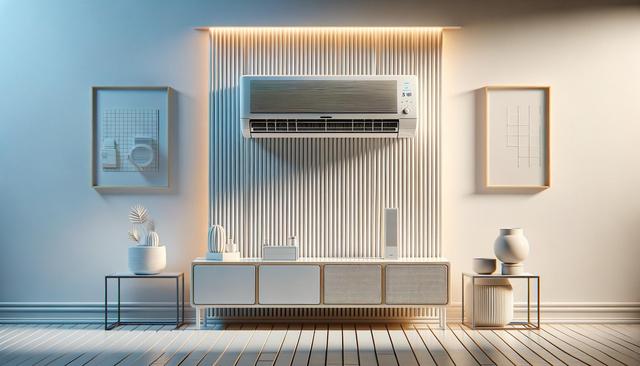How to Cool a House Without Central AC
Not everyone has access to central air conditioning, especially in older homes or smaller apartments. If you’re wondering how to cool a house without central AC, there are several practical and cost-effective methods worth considering. One of the most efficient strategies is to improve natural ventilation. Opening windows in the early morning and late evening allows cooler air to circulate, while closing them during the hottest part of the day helps keep heat out.
Another method is to use ceiling and oscillating fans strategically. Fans don’t lower the temperature but can make a space feel several degrees cooler by moving air over your skin. Reflective window treatments, such as blackout curtains or thermal shades, reduce heat gain from sunlight. Additionally, placing box fans in windows facing outward can push hot air out, further improving airflow.
Consider also these cooling techniques:
- Use LED lighting instead of heat-producing incandescent bulbs.
- Cook outdoors or use a microwave to avoid heating the kitchen.
- Place a shallow pan of ice in front of a fan for a DIY air chiller effect.
These strategies can help maintain a livable indoor temperature even during warm periods, especially when paired with portable air conditioning solutions.
Do Portable Air Conditioners Work in Heatwaves?
Many people ask, do portable air conditioners work in heatwaves? The short answer is yes, but their effectiveness depends on several factors, including the size of the room, insulation quality, and the unit’s BTU rating. Portable AC units are designed for single-room use and can offer significant relief when used correctly. However, during intense heatwaves, their performance may be limited in larger or poorly insulated spaces.
To maximize efficiency during extreme heat, it’s essential to:
- Ensure the portable unit is appropriately sized for the room.
- Seal windows and doors to prevent cool air from escaping.
- Regularly clean or replace filters to maintain airflow.
- Position the exhaust hose properly to expel hot air outside.
While not as powerful as central systems, portable air conditioners offer a flexible and accessible way to stay cool. In combination with other cooling methods, they can significantly improve comfort levels during heatwaves.
Best Cheap AC Units for Apartments
When shopping for affordable cooling solutions, many renters look for the best cheap AC units for apartments that won’t compromise on performance. While high-end models offer premium features, there are budget-friendly options that deliver reliable cooling without breaking the bank.
Affordable AC units for apartments generally fall into three categories: window units, portable air conditioners, and mini-split systems. Among these, window and portable ACs tend to be more accessible due to easier installation and lower upfront costs. When evaluating options, consider energy efficiency ratings, noise levels, and ease of maintenance.
Here are a few qualities to look for in cost-effective units:
- Energy Star certification to reduce electricity costs.
- Multiple fan speeds and thermostat controls for customization.
- Compact size suited to small spaces.
- Washable or replaceable air filters.
Many of these models are well-regarded for their performance in studio or one-bedroom apartments, offering a practical solution for those needing relief from the heat on a budget.
Window vs Portable AC: Pros and Cons
Choosing between a window and a portable air conditioner can be challenging, especially when each type has benefits and drawbacks. When comparing window vs portable AC: pros and cons, it’s important to evaluate your living space, installation limitations, and cooling needs.
Window AC units are known for their energy efficiency and higher cooling capacity. They are typically quieter and less obtrusive once installed. However, they require a suitable window size and may not be permitted in some rental agreements. Installation can be slightly more involved, and removing them at the end of the season may be necessary.
Portable units offer greater flexibility and ease of setup, making them ideal for renters or those who move frequently. They can be moved from room to room but usually take up floor space and may be noisier. Additionally, they often have lower energy efficiency ratings compared to window units.
Pros of window units:
- More efficient cooling performance.
- Quieter operation.
- Better energy efficiency.
Pros of portable units:
- Easy to install and move.
- No structural changes required.
- Useful in rooms without suitable windows.
Understanding these trade-offs helps you make a more informed decision based on your specific needs and living situation.
Maximizing Your Cooling Strategy
Creating a comfortable living environment during summer goes beyond choosing a single cooling solution. Whether you’re investigating how to cool a house without central AC or comparing units for a small apartment, combining strategies often yields the best results. Layering passive cooling methods with mechanical options can enhance overall effectiveness and lower energy consumption.
For example, using thermal curtains during the day and running a window or portable AC in the evening can reduce strain on the unit. Fans can help distribute cool air more evenly, while sealing drafts prevents conditioned air from escaping. Regular maintenance, such as cleaning filters and checking for leaks, ensures long-term performance and efficiency.
Additionally, consider your home’s layout and daily habits. Cooling only occupied rooms, using smart plugs or timers, and avoiding heat-generating appliances during the day can all make a noticeable difference. Even small changes, like switching to lighter bedding or sleeping with a fan directed toward the bed, can improve comfort without major expense.
Ultimately, the goal is to create a sustainable and manageable approach to staying cool. With the right mix of techniques and a clear understanding of your needs, you can maintain comfort even during the hottest months.
Conclusion: Choosing the Right Cooling Approach for Your Needs
Whether you’re enduring a heatwave or just trying to sleep comfortably on a warm summer night, understanding your air conditioning options is key. From learning how to cool a house without central AC to comparing window vs portable AC: pros and cons, the right information helps you make smart, cost-effective choices. Portable units do work during intense heat if used properly, and there are several highly rated, affordable options for apartment dwellers. By combining energy-saving techniques with the right equipment, staying cool can be both practical and budget-friendly.




Leave a Reply